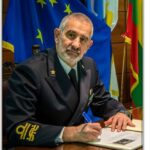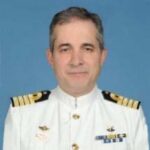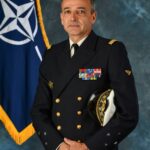
Rear Admiral Stefano TURCHETTO was born in Treviso on March 19 th, 1966. He attended the Naval Academy in Livorno (Tuscany) from 1985 to 1989, graduating as a Midshipman.
After a short training period onboard Destroyer DUILIO, he attended the Anti Submarine Warfare (ASW) course at the Naval Air Training Centre in Taranto and, from April 1990, he was assigned to Corvette DRIADE as ASW Officer.
From September 1990, as Lieutenant Junior Grade, he was assigned to the Naval Academy in Livorno as the cadets’ Supervising Officer.
From October 1991 to August 1992, he was posted to Frigate ALPINO as ASW Officer and, thereafter, he attended the ASW Higher Level and specialization courses, achieving full expertise in this sector.
From 1993 to 1996, he served as Head of ASW Division on board Frigate LIBECCIO.
In 1997, he attended the Staff Course at the Maritime Warfare Institute in Livorno and the Naval Command School in Augusta.
From August 1997 to August 1998, he was appointed Commanding Officer of Patrol Boat LIBRA, based in MESSINA and primarily employed in fishing protection duties in the Strait of Sicily.
From September 1998 to December 2000, he was appointed as Head of ASW Division and, later, as Head of Operations Department on board Cruiser VITTORIO VENETO. During this period, in January 1999, he was promoted Lieutenant Commander.
From 2000 to 2003, he was Cadet Class Commander in the Naval Academy, where he oversaw the induction of the first class with female personnel in the Institute’s history.
He was promoted Commander on January 1st, 2003 and attended the 6th Joint High Level Staff Course at the Defence High Studies Centre in Rome. He was subsequently assigned to the Centre in 2004 as a tutor for the following courses until 2006.
From August 2006 to September 2007, he served as Commanding Officer of Frigate LIBECCIO. In the three years period 2007 – 2010, he was Liaison Officer at the German Ministry of Defence in
BERLIN. He was promoted Captain on July 1st, 2009.
During the two years period 2010 – 2012, he served as Head of the Training and Regulations Division at the Italian Fleet Headquarter in Rome.
From October 2012 to September 2013, he was Commanding Officer of Destroyer ANDREA DORIA, partaking in the main national exercises and in support of the Italian UNIFIL troops deployed in Lebanon as part of the UNIFIL mission.
From October 2013 to October 2016, he was the Naval Academy Executive Officer (Second in Command).
From October 2016 to July 2018, he was Head of the Italian Joint Operations Headquarter Commander’s Office.
He was promoted Rear Admiral (LH) on January 1st, 2018.
From September 2018 to June 2019, he served as Force Commander of EUNAVFOR MED – Operation SOPHIA.
From September 2019 to September 2021 he was First Naval Division Commander, based in La Spezia. During this period he served as Tactical Commander for “Operazione Mare Sicuro” on four separate occasions, operating in the Central Mediterranean Sea On the 1st of October 2021, RAdm TURCHETTO was appointed as Commander of Operation EUNAVFOR MED Irini, where he continues to serve.
Rear Admiral TURCHETTO graduated cum laude in Naval and Maritime Sciences from the University of Pisa (Tuscany). He has been awarded numerous national and international decorations.
Rear Admiral TURCHETTO is married to Rossella and they have two children, Francesco and Viola.

Captain Vasileios Beletsiotis, OHQ/ACOS CJ3 of Operation EUNAFOR MED IRINI, was born in Athens, in 1967. He joined the Hellenic Naval Academy in 1985, graduated and commissioned as Ensign of the Hellenic Navy in June 1989.
He has been promoted to:
His first duty was aboard DDG HS KOUNTOURIOTIS. Following duties include serving as Navigation, Ops and Weapons Officer aboard Guided Missiles Fast Patrol Boats HS MPLESSAS and HS LASKOS. He served as Executive Officer of PB HS ANTONIOU and PBFA HS KONIDIS.
He assumed command of Patrol Boat HS ANDROMEDA, Guided Missile Fast Patrol Boat HS SAKIPIS and Frigate HS NIKHFOROS FOKAS.
He has been specialized as an artillery officer. His shore and staff assignments include Ops Officer at the Hellenic Surveillance Ships Command
of the Hellenic Fleet, and staff Officer in the Hellenic Naval Academy and in the Hellenic Navy General Staff Training and Education Directorate as well. He also served as spokesperson at the Hellenic National Defense General Staff from 2015 to 2019 and assistant to the spokesperson of the Ministry of National Defense in 2019.
From 2019 to 2020 he served as Commander of the Hellenic Surveillance Ships Command of the Hellenic Fleet, and from 2020 to 2022 he served as Director of Hellenic Navy General Staff Personnel Directorate.
He attended and is a Hellenic Navy Naval Command and Staff College, Hellenic Supreme Joint War College and United States Naval War College graduate.
He holds a law degree from the University of Athens.
He speaks English.
He has been awarded with all medals, decorations and commendations stipulated for an officer of his rank and seniority.
He is married and a father of two daughters.

Rim Berahab is a Senior Economist at the Policy Center for the News South, a Rabat-based think tank she joined in 2014. She specializes in energy economics and works on several research topics related to energy resource management, climate and energy policy, energy security, and their link to long-term development, focusing on Africa and Morocco. She also works on decarbonization strategies in Morocco, focusing on economic, institutional, and regulation issues. Her research areas also cover trade and regional integration. Previously, she has also worked on issues related to gender inequalities in the North African labor market. Rim spent three months at the International Monetary Fund (IMF) in 2016 in the commodities unit of the research department. She holds a state engineering degree from the National Institute of Statistics and Applied Economics (INSEA).

James H. Bergeron assumed duties as Political Advisor to Commander, Allied Maritime Command in Northwood, United Kingdom on 1 September 2013 . Previously the POLAD to Naval Striking and Support Forces NATO from July 2005 as a member of the US Government Service, he is considered to be one of NATO’s most experienced foreign policy advisors in the fields of maritime and joint expeditionary operations. He has served as POLAD in eighteen US and NATO exercises; as POLAD to the NATO Response Force exercise Steadfast Jaguar in Cape Verde and NATO Riga Summit mission in 2006; in a national capacity as POLAD to EUCOM Commander Joint Task Force Lebanon during the 2006 Israel-Hezbollah Conflict; to Commander US Naval Forces Europe during the August 2008 Russia-Georgia Conflict and as POLAD to STRIKFORNATO for four Baltic Host and two BALTOPs exercises to reassure Allies of NATO solidarity. From March until July 2011 he served as the Political Advisor to NATO’s CJTF Operation Unified Protector in support of UNSCR 1973 operations in Libya. He is regularly consulted on NATO maritime strategy, transformational issues and NATO-EU relations, and was one of the drafters of the Alliance Maritime Strategy. Prior to his appointment in Naples, Mr. Bergeron served as EUINATO Policy Advisor on the Staff of Commander, US Naval Forces Europe, London.
Professor Bergeron entered the US government service following a career in academia. He holds a BA in History and English Literature from the University of the State of New York, MA in Political Science from the Maxwell School of Citizenship and Public Affairs at Syracuse University, Juris Doctor magna cum laude from the College of Law at Syracuse University and Master of Laws in European Union Law from the London School of Economics and Political Science, University of London, as a British Foreign and Commonwealth Scholar. Following completion of the LL.M. in 1991, Mr. Bergeron joined the Faculty of Law at University College Dublin, Ireland, where he specialized in European Union law, European affairs, comparative antitrust, international law and jurisprudence. From 1991-2000 he held visiting appointments at the Nicolas Copernicus University, Torun, Jageillonian University, Krakow, Riga Graduate School of Law; Onati International Institute for the Sociology of Law, Spain and S1. John’s University College of Law, New York. In 1993 he developed the draft Estonian Code of Military Justice under the US European Command’s military-to-military contacts program. Under the auspices of the European Commission he assisted in the revision of the Latvian Constitution from 1998-9 and training of Hungarian public prosecutors in EU law from 1999-2000. He served briefly on the Forward Studies Unit of the President of the European Commission.
His connections to the naval life are oflong standing. Mr. Bergeron entered the United States Navy in 1976. After two years of nuclear propulsion training, he served as a reactor operator onboard USS ULYSSES S. GRANT (SSBN 631) and USS HOUSTON (SSN 713) in Newport News, Virginia. In July 1982 he reported to Officer Candidate School in Newport, Rhode Island. Upon commissioning as an officer and completion of submarine and Poseidon missile schools, he served on USS GEORGE C. MARSHALL (SSBN 654) as Assistant Weapons Officer. This was followed by twenty-one years in the US Navy Reserve, supporting US Naval Forces Europe, US Embassy Dublin and Allied Forces Southern Command in the areas of politico-military analysis and advice, partnership engagement and security cooperation. Commander Bergeron retired from the Navy Reserve in October 2007.
Jim Bergeron has published several articles and book chapters on legal, political and international security topics, and is the editor, with Peter Fitzpatrick, of Europe’s Other: European Law from Modernity to Post-Modernity (Ashgate 1998). He has spoken at numerous institutions, defense colleges, universities and think tanks including the Center for Naval Analysis, Naval Postgraduate School Monterey, Chatham House, NATO Defense College, Britannia Royal Naval College Dartmouth, RUSI, Institute for International Affairs (IA!) Rome, National Defense University, Wilton Park and the Maritime Warfare School Halifax. He has had a long involvement with the American Bar Association, and currently serves as the ABA liaison to NATO, the International Maritime Organisation and the International Committee of the Red Cross. Personal decorations include the Meritorious and Superior Civilian Service Medals, Navy Commendation Medal, Joint Service Achievement Medal, Navy Achievement Medal, NATO Libya Medal and the Golden Badge of the Estonian Ministry of Defence. Interests include naval history, art, early music, political theory, and military strategy.

Christian Bueger is Professor of International Relations at the Department of Political Science, University of Copenhagen. He is also an honorary professor of the University of Seychelles, a research fellow at the University of Stellenbosch and one of the directors of the SafeSeas network.
Previously he was professor of international relations at Cardiff University and held visiting fellowships at the University of Malta (2022), University of Bologna (2022), National University of Singapore (2015 & 2018), University College London (2015) and the University of Copenhagen (2013 & 2014). He was a Leverhulme Fellow at the Greenwich Maritime Institute, London (2011) and a research fellow at the Institute for Development and Peace, Duisburg, Germany (2010).
Professor Bueger is the author, co-author and editor of several books and over 150 articles on global governance, international practice theory, the politics of expertise, maritime security, and blue crime. In his current grant funded projects he is studying regional responses to blue crime in the Indo-Pacific (TOCAS), maritime security governance in Ghana (AMARIS), the protection of submarine data cables (DACANE) and ocean infrastructures (OCINFRA). His research has been funded, among others, by the UK’s Economic and Social Research Council (ESRC), the British Academy, the Leverhulme Trust Fund, the Danish Ministry of Foreign Affairs (DANIDA) and the Velux Foundation. In 2013 he was recipient of an ESRC future research leader award.
He was the lead editor (Europe) of the European Journal of International Security (Cambridge UP) from 2014 to 2019, and the founding editor of piracy-studies.org – the research portal for maritime security (until 2019). Actively combining research with practical work he regularly acts as consultant and speaker at conferences on international policy, maritime security and transport security. His research has featured in different media, including, Al Jazeera, ITV, The Guardian, Africa Renewal, or Wall Street Journal.
He obtained his PhD in Political and Social Sciences from the European University Institute, Florence, Italy (2010). During his PhD studies, he was a visiting researcher at Cornell University and a research assistant to the European Report on Development 2009. Prior he graduated as a Diplom-Politologe from the Goethe University Frankfurt am Main and worked as a research assistant at the Institute for Social Research (IFS), Frankfurt am Main and the Peace Research Institute Frankfurt (HSFK).

Nick Childs is responsible for the Institute’s analysis of naval forces and maritime security, and for the data on sea power capabilities published in The Military Balance. It is also his job to formulate and deliver research projects in these areas, and contribute to other Institute publications and activities, including conferences and consultancy.
Background
Before joining the IISS, Nick worked at the BBC for more than three decades, most recently as world affairs correspondent, but also as their defence and Pentagon correspondent.

Eugenio Dacrema works as an economic risk analyst at the World Food Programme’s headquarters in Rome. He focuses on emerging risks affecting food security and poverty in the MENA region, East Africa and Asia. As a member of WFP’s Early Warning team, his main task is to anticipate new humanitarian crises globally in order to ensure that WFP has the time to deploy the necessary preparedness actions. Together with his team, he also coordinates the United Nations’ inter-agency committee on Early Warning. Prior to this post, he was co-head of the Instituto per gli Studi di Politica Internazionale (ISPI)’s Mediterranean programme and a consultant for the Italian Parliament. He holds a PhD in International Relations from the University of Trento and was visiting scholar in the US, Germany, and Lebanon.

Tim Eaton is a senior research fellow with Chatham House’s MENA Programme. His research focuses on the political economy of the Libyan conflict.
In 2018, he authored a report on the development of Libya’s war economy which illustrates how economic activities have become increasingly connected to violence.
Previously, he managed Chatham House’s research on the Syrian conflict.
Prior to joining Chatham House, he worked for BBC Media Action, BBC’s international development charity, on projects in Iraq, Egypt, Tunisia and Libya. In Libya, Tim helped to set up and manage BBC Media Action’s bureau from 2013 until 2014.
He is a regular contributor to the media, having written for the Washington Post, BBC, Newsweek, CNN, War on the Rocks and the New Statesman, among others.
Tim was awarded the Institute of Arab and Islamic Studies Departmental Scholarship to undertake his MA in Middle East politics at Exeter University. He also holds a BA in history from Nottingham University and a diploma in Arabic from SOAS.

Dr. Daniel Fiott is Head of the Defence and Statecraft Programme at the Centre for Security, Diplomacy and Strategy (CSDS) of the Brussels School of Governance (BSoG-VUB). Daniel is also a Non-Resident Fellow at the Madrid-based Real Institute Elcano, where he analyses defence industrial issues. Daniel was educated at the University of Cambridge and he holds a PhD from the VUB. He earned his PhD on European defence-industrial cooperation at the Brussels School of Governance in 2017, and conducted research from 2012-2016 at the School on European defence policy and defence industrial issues. From 2016-2022, Daniel was Security and Defence Editor at the EU Institute for Security Studies (EUISS) – the Institute is an official agency of the EU. From 2017-2022, Daniel served as a Visiting Lecturer at the Brussels School of International Studies (BSIS), University of Kent. From 2014-2016 Daniel was a fellow of the Research Foundation – Flanders (FWO) following their decision to award Fiott with a scholarship for his doctoral research. Before this time Daniel worked for the College of Europe and various other think tanks.


Professional journalist. Editor-in-chief of Formiche magazine since July 2012. She has taken the direction of Airpress, a monthly magazine focused on aerospace and defense policy, since 2013.

Sidharth Kaushal’s research at RUSI covers the impact of technology on maritime doctrine in the 21st century and the role of sea power in a state’s grand strategy.
Sidharth holds a doctorate in International Relations from the London School of Economics, where his research examined the ways in which strategic culture shapes the contours of a nation’s grand strategy.

Rear Adrmiral (l.h.) Massimiliano Lauretti was born in Frosinone on April 3rd 1970.
Upon completing the high school, he joined the Naval Academy in Livorno where he attended his initial officer training, from 1989 to 1993, graduating in Maritime and Naval Sciences at the University of Pisa.
In 1994 he was appointed as Surface Warfare Officer and sent on board (FFG) ITS ALISEO as weapons officer until 1997.
In 1998 he was employed with the same duty on board (FFG) ITS GRECALE until 2001.
In 2003, after attending the Naval Commanding School in Augusta and the Naval Warfare Advanced School in Venice, was appointed Commanding Officer of the (AWT) ITS TICINO (August 2003 – August 2004).
In 2004 he was assigned on board (DDG) ITS DURAND DE LA PENNE where he attended several staff duties (up to OPSO).
From November 2006 to June 2012, he served at the ITALIAN NAVY GENERAL STAFF, as Head of “Operational Planning and Training” Section.
On July 11th 2012, he was appointed Commanding Officer of the (OPV) ITS CIGALA FULGOSI.
From August 2013 to August 2017 he was assigned at the ITALIAN NAVY GENERAL STAFF, as the Head of Operations Office for Plans, Operations and Maritime Strategies Department.
From 11th September 2017 to 15th October 2018, he was appointed Commanding Officer of the (DDG) ITS FRANCESCO MIMBELLI.
Since 1st November 2018 to date he has been serving as Head of Plans and Operations Department of the Command in Chief of the Fleet (CINCNAV).
Since 10 January 2022, he is Head of Plans & Maritime Policy Department of the Italian Navy General Staff (Rome).

Alessia Melcangi is Tenure Track Assistant Professor of Contemporary History of North Africa and the Middle East at the Department of Social Sciences and Economics, Sapienza University of Rome, NonResident Senior Fellow for the North Africa and Middle East Program at the Atlantic Council and Associate Research Fellow at the Middle East and North Africa Centre at ISPI. She is faculty member of the Master in Migration and Development, La Sapienza University of Rome and coordinator of its Socio-Political module and faculty member of the Master in Middle Eastern Studies – MIMES, Catholic University of the Sacred Heart, Milan. She collaborates with the Centre of Research on the Southern System and the Wider Mediterranean (CRiSSMA – Catholic University of the Sacred Heart, Milan) and she is member of the scientific committee of the The Military Center for Strategic Studies (Ce.Mi.SS) of the Centre for Defense Higher Studies (CASD), Rome. She has been member of several working groups in Track-2 programs sponsored by the Italian Minister of Foreign Affairs about the contemporary Libyan political, economic and security dynamics and the issue of religious freedom and human rights in the Middle East. Her research is mainly into conflict and governance in the Middle East and North Africa; geopolitics and international relations in the Euro-Mediterranean area; identity and polarization dynamics in the contemporary Middle East; political and social issues in contemporary Egypt and Libya. Among here publications I copti nell’Egitto di Nasser. Tra politica e religione (1952 – 1970) (Carocci, Roma 2017).
and the co-edited North African Societies After the Arab Spring: Between Democracy and Islamic Awakening (Cambridge Scholars Publishing, Newcastle upon Tyne 2016).

Vincenzo Palmieri is an analyst within Eni, an international energy company. He works in the International Affairs and Business Support Department and is the reference for political analyses on North Africa.
He monitors significant events and the evolution of geopolitical scenarios and to this end he maintains appropriate links with other relevant units of the Company or external stakeholders.
Vincenzo had joined Eni in 2010 as a security analyst, and he has been also part of the Company’s Crisis Unit. He had been previously a researcher on international relations, energy, and security focusing on the wider Mediterranean basin, the Sahel, Western and Eastern Africa.
He has achieved a cum laude degree in International Sciences at the University of Naples – “L’Orientale”, later followed by classes in Diplomacy and by a master’s degree in International Journalism jointly organized by the Center for American Studies in Rome and the Italian Chief Staff of Defence.

Stefan D. Pauly joined the German Navy in 1982. He began his career with the German Submarine force at Submarine Squadron 1. He commanded “Unterseeboot U-25” from 1991 through 1993 and served as the Commander of Submarine Squadron 3 from 2002 to 2004. Following command, he was appointed as Assistant Chief of Branch for Naval Operations in the Ministry of Defense Navy Staff, where he supported planning of national naval operations and German Navy contributions to multinational exercises and operations. From 2010 through 2013, he headed the Command and Control Group for Maritime Operations at the Bundeswehr Joint Forces Operations Command, where he was responsible for the mission-related coordination of maritime operations with allies and coalition partners.
He attended the Federal Armed Forces Command and Staff College from 1995 through 1997, focusing on national security decision-making, strategy and policy, joint and combined military operations and graduated from the German Capstone Course in 2015.
Ashore, Stefan has spent significant time in military intelligence. He served in the Intelligence Directorate at Fleet Command and consequently appointed as Section Head for Strategic Intelligence for NATO HQ SACLANT, Norfolk, Virginia, USA. He was also an analyst focusing on the Middle East and Northern Africa as part of the Joint Staff for the Federal Ministry of Defense. After completing a tour with the Federal Intelligence Service, Stefan became the Head of Naval Intelligence at the German Navy Headquarters in 2013, followed by an appointment to Branch Head for Military Intelligence for the Federal Ministry of Defense-General for Strategy and Operations. Afterwards Stefan was assigned as the Assistant Chief of Staff J2 at NATO HQ JFC Naples, where he directed the collection and processing of critical information regarding the operational environment in NATO’s Strategic Direction South. In 2019, Stefan became the inaugural Chief of Staff for the newly formed Allied Joint Force Command Norfolk in Norfolk, Virginia, USA.
In June 2022, he was appointed Commander Surface Forces NATO and Deputy Chief of Staff Operation at NATO’s Maritime Command in Northwood.

Having joined the Naval Academy in Brest in 1983, Didier Piaton entered the realm of naval aviation at the beginning of his career. As a junior officer, he qualified as a helicopter pilot and specialized in anti-submarine warfare. He then was deployed in many operations notably in the Gulf, Horn of Africa and the Balkans. He concluded his first operational experience by commanding the newly created helicopter 36th squadron based in Toulon.
Graduated from Joint War College in 2000, he was then assigned to the Joint Military Headquarters in Paris where he carried out strategic level planning duties, dealing in particular with NATO and EU-led operations in the Balkans.
Between 2004 and 2010, he served mainly at sea assuming command of a surveillance frigate based in the French West Indies (FS Ventôse 2004-2006), and the recently commissioned LHD Mistral based in Toulon (2008-2010).
After this operational period, where he contributed mainly to counter-narcotics trafficking operations, crisis prevention in the Gulf of Guinea, and emergency interventions operations, he attended the 117th session of the NATO Defence College Senior Course in Rome (2010-2011).
He started this senior level part of his career with shore appointments including Human Resources management (2011-2014) as well as Public Affairs Officer and spokesman for the Chief of Staff of the French Navy (2014-2016).
Promoted Rear-Admiral (LH) in 2016, he assumed command of French Naval Forces deployed in the Indian Ocean and of the French forces based in Abu Dhabi, acting also as French National contingent Commander of Operation for Inherent Resolve (Iraq) until 2018. He served as deputy to the Chief of Staff/Operations at the Joint Staff in Paris (2018-2020), supervising the COVID-19 ministerial crisis cell from the Joint Staff.
Upon promotion to his present rank in June 2020, Vice-Admiral Piaton has been the Deputy Commander at the Allied Maritime Command (MARCOM) in Northwood (UK).
He holds various decorations and awards, including Commander of the Legion of Honour, Commander of the National Merit, the Military Valour Cross, the Overseas Medal (Middle East and Somalia clasps), and the Aeronautical Medal.
Married to Dominique, they raised five beloved children.

Ruben-Erik Diaz-Plaja is a Senior Policy Adviser in the Policy Planning Unit in the Office of the Secretary General at NATO HQ in Brussels, where he contributes to developing, negotiating and implementing strategic policy priorities for the Secretary General, as well as conducting research and foresight. In this role, he has contributed to developing the 2022 Strategic Concept; the NATO 2030 agenda for the future of NATO; the 2021 Climate Change and Security Action Plan; and a comprehensive reform of the NATO Headquarters in 2018. Between 2012 and 2018, Ruben led work on NATO’s partnerships in the Political Affairs and Security Policy Division. Ruben has more than 15 years’ experience working at the intersection of defence, security and democratic governance in the wider Euro-Atlantic region, including previous work with the OSCE in Warsaw, Poland, and Kosovo (2007-2012) helping to build democratic institutions in Eastern Europe/the Balkans. A Spanish/Dutch national, Ruben holds degrees in Politics (Edinburgh University, ‘04) and International Relations and Economics (Johns Hopkins University School of Advanced International Studies, ‘06).

Dr Umberto Profazio is a Maghreb Analyst at the NATO Defense College Foundation. He regularly writes about political developments, security and terrorism in the North Africa region, focusing on the conflict in Libya, the politics and geopolitics of the Maghreb and the role of non-state actors.
Dr Profazio was previously a Libya analyst working on the Armed Conflict Database at The IISS. He holds a PhD in history of international relations from the University of Rome (Sapienza), with a thesis on Libya after independence. Dr Profazio has been interviewed by several media sources, including Agenzia Nova, Al Arabiya, Arab News, Bloomberg, Il Foglio, Radio Popolare, Radio Rai 3, Radio 24, RFI and TRT.

Jamie Shea is Professor of Strategy and Security within the Strategy and Security Institute at the University of Exeter (since September 2018). He is also a Senior Fellow responsible for security and defence programmes at Friends of Europe and a Senior Advisor with the European Policy Centre. Both of these think tanks are based in Brussels. He holds two other academic positions: Distinguished Professor of the Practice of Diplomacy and Security at the Institute of European Studies, Vrije Universiteit Brussel, Belgium; Visiting Professor, Department of Politics at the University of Surrey.
Jamie Shea also serves as Secretary General of the Global Military Advisory Council on Climate Change (GMACCC) and is an Associate Fellow of the International Security Programme at Chatham House, United Kingdom. He is also a member of the Senior Mentors group, advising the NATO Special Operations Forces Headquarters at SHAPE, Belgium Jamie Shea was awarded a CMG in the New Year’s Honours list 2020.
From 1980 to 2018, Jamie Shea was a member of the International Staff of NATO in Brussels. His last position was Deputy Assistant Secretary General for Emerging Security Challenges where he was responsible for taking NATO’s work forward in areas such as non-proliferation of weapons of mass destruction, cyber defence, counter-terrorism and energy security. He oversaw strategic analysis and forecasting as well as the NATO Science for Peace and Security programme, which develops and funds capacity-building, and technology projects with NATO’s partner countries across the globe.
Jamie Patrick Shea CMG (born 11 September 1953 in London) was Deputy Assistant Secretary General for Emerging Security Challenges at NATO Headquarters in Brussels, Belgium until his retirement in late September 2018. He received worldwide attention during the 1999 Kosovo War, when he served as the spokesperson for NATO. He described the civilians killed by the NATO bombing of Serbia in the effort to prevent the Serbs from retaining Kosovo as the “cost to defeat an evil”. He received his B.A. (Hons.) in Modern History and French from the University of Sussex (1977) and his D.Phil. in Modern History from Lincoln College, Oxford (1981). Shea was appointed Companion of the Order of St Michael and St George (CMG) in the 2020 New Year Honours for services to diplomacy and public service.

Dr George N. Tzogopoulos (Ph.D. Loughborough University, UK, 2009) is an expert in media, international relations and Chinese affairs. He is member of CIFE core faculty and Senior Fellow, as well as director of the module ‘Conflict and Co-operation in the International System’ within the MA ‘European Integration and Global Studies.’ George is also the director of EU-China programmes at CIFE and leads partnerships with several Chinese academic institutions. Additionally, he has carried out several CIFE research programs under the aegis NATO Public Diplomacy Division, including the December 2021 ‘Building Security in Iraq’ conference. He recently, edited a special CIFE e-book about The EU and the Eastern Mediterranean: The Multilateral Dialogue Option which includes a prologue by Ambassador Nikolaus Meyer-Landrut. George systematically organises different CIFE discussions on current affairs, for example on US foreign policy, the Eastern Mediterranean, and China’s Belt and Road Initiative (with Aydin University).
George is also is Senior Fellow at the Hellenic Foundation for European and Foreign Policy (ELIAMEP), and the Begin Sadat Center for Strategic Studies (BESA) in Israel, and Lecturer in International Relations at the Democritus University of Thrace. He is the author of three books: US Foreign Policy in the European Media: Framing the Rise and Fall of Neoconservatism (IB TAURIS), The Greek Crisis in the Media: Stereotyping in the International Press (Ashgate) and The Miracle of China: The New Symbiosis with the World (Springer and China Social Sciences Press). George has been selected as ‘young leader’ by China’s Diplomatic Academy and is an alumnus of the US Department of State after participating in an International Visitor Leadership Program (IVLP) about US Foreign Policy in 2019. Furthermore, he is the Co-convener of Israel-Hellenic Forum under the umbrella of B’nai B’rith International, and his work regularly appears in international media. George’s recent essays about China and the World During the COVID-19 Pandemic, Greece, China and the 17+1 Initiative, The Digital Markets Act: Between European Autonomy and Transatlantic Cooperation, and The Way Forward in Greek-Russian Relations have been selected in the think tank review of the Council of the EU.

Dr. Thomas Volk is since July 2020 the Director of the Regional Program Political Dialogue in the South Mediterranean of the Konrad-Adenauer-Stiftung (KAS), based in Tunis. Before he was since December 2016 the Resident Representative of KAS for Senegal and The Gambia, based in Dakar. Starting in 2014 he was the Coordinator for Islam and the Dialogue between Religions in the Department for Politics and Consulting in the Headquarters of KAS in Berlin. He studied Middle Eastern Studies and History in Freiburg and graduated from the German-Turkish Masters Program in Social Sciences at the Middle East Technical University Ankara and Humboldt-University Berlin. He holds a PhD in Near- and Middle Eastern Studies from the University of Basel, Switzerland.

Dr. Catherine Warner is the Director of NATO’s Centre for Maritime Research and Experimentation in La Spezia, Italy. She was selected in 2017 following 25 years’ experience in defence science and technology, studies, analyses, management, and operational test and evaluation.
Dr Warner was the primary technical advisor to the Director, Operational Test and Evaluation within the US Office of the Secretary of Defense; her mission was to ensure the office fulfilled its statutory responsibility on the oversight and reporting of test and evaluation results for major weapons systems to Congress and senior Defence Department leadership. She was an active participant with academia and government researchers developing modern statistical methods for defense test and evaluation. She was responsible for developing executive training for military and civilian test and acquisition professionals in the fields of requirements development, design of experiments, reliability management and human factors. For the past two years, she was the technical director for the international procurement of high power ground based radars as part of major upgrades to the US open-air test and training ranges.
In 2013 at the request of the Defense Information Systems Agency (DISA), Dr Warner deployed to Kabul, Afghanistan for 16 months in support of NATO’s International Security Assistance Force (ISAF) and the US Operation Enduring Freedom (OEF). She led a team of Information Technology specialists in advising Afghanistan’s Ministry of Communications and Information Technology on enhancing national communication capabilities for the security and economic growth of the country. The primary focus of this team included supporting the completion of Afghanistan’s National Fiber Optic Ring, Spectrum Management, and Cyber Security.
From 1991 to 2010, Dr Warner was a research staff member at the Institute for Defense Analyses in Alexandria, Virginia where she performed analysis of operational tests for Army, Navy, and Air Force systems. She was an Assistant Director and the lead for Air Warfare. Her analysis portfolio included major aircraft systems such as the F-22, F/A-18E/F, V-22, and H-1. Earlier, she was the lead analyst for Unmanned Aerial Vehicle (UAV) systems including Predator, Shadow, Hunter, and Global Hawk.
Previously Dr Warner worked at the Lawrence Livermore National Laboratory. She grew up in Albuquerque, New Mexico, attended the University of New Mexico and San Jose State University as an undergraduate and earned both M.A. and Ph.D. degrees in Chemistry from Princeton University.
During her career, Dr. Warner earned the NATO Meritorious Civilian Service Medal, DISA Exceptional Civilian Service Award, and the Presidential Rank Award.

Francesco Zampieri is a professor, in charge of the Strategy Department at the Italian Naval Staff College, located in Venice, Italy, since September 2017.
Since 2002 Dr. Zampieri has been the author, at Naval Staff College, of the study of the political, strategic and military backstage activity of the wars, focusing in particular on the influence of Sea Power on the wars.
Between 2001 and 2002, Dr. Zampieri has been collaborating with the Italian Admiralty board to complete the Italian Naval Strategy Document. The paper investigates the maritime scenario of the next thirty years. In particular, Dr. Zampieri carried out the historic and strategic analysis and wrote the chapters about the Italian sea power elements and the naval operations.
Between 2013 and 2016, Dr. Zampieri joined the Océanides Project, an international research programme in maritime history, focused to study the influence of the sea on human history.
Since September 2017, Dr. Zampieri is Professor of Strategy and of Polemology and Military History at Naval Staff College.
Since September 2018, Dr. Zampieri is Professor of Geopolitics of the Seas at “La Sapienza” University in Rome.